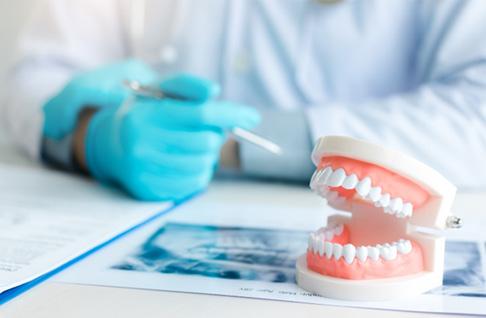DENTURES – FORT WORTH, TX
A Comfortable Way to Restore Your Smile
Dentures are one of the most popular dental restorations with a long and reliable track record. Thanks to recent advancements in dentistry, this effective solution has become even more comfortable, durable, and natural-looking than ever before. So, if you’re interested in rebuilding missing teeth, our team at Hulen Crossing Family Dental can provide a great solution with dentures in Fort Worth! Feel free to read along or give us a call today if you wish to learn more!
Why Choose Hulen Crossing Family Dental for Dentures?

Durable & Natural-Looking
Dental Restorations

Professional, Dedicated &
Friendly Dental Team

We Accept Dental Insurance &
Offer Alternative Financing
Who’s a Good Candidate for Dentures?
EFFECTS OF MISSING TEETH
During the treatment’s consultation phase, we’ll guide you through tooth loss’ causes and effects. Doing so will help you see how prosthetic teeth can protect your health.
Truthfully, people lose teeth for various reasons. A patient’s tooth may decay so much that it falls out or needs extraction. Meanwhile, gum disease wears down the bone and tissue that secure your pearly whites. Your teeth can also get knocked out by an accident or injury.
No matter its cause, though, tooth loss has deeply adverse effects. The biggest is that it makes everyday tasks – eating, speaking, smiling, etc. – much harder. At the same time, untreated smile gaps will slowly erode your jaw. (This process could then trigger a facial collapse.) They can also result in yet more tooth loss.
WHAT QUALIFIES YOU FOR DENTURES?
Again, most patients can qualify for dentures if they lack teeth. Even so, there are other factors to ponder.
Take oral health, for instance. You could get dentures to replace decayed existing teeth rather than “fill in” for missing ones. At the same time, remember that treatment only works if your gum and jaw tissues are healthy enough. An ideal candidate is thus committed to proper dental care.
How many teeth you lack is also a concern. Based on the number, you’ll need one of two possible denture types. A partial model (per the name) is best for replacing a few teeth. Full dentures, in contrast, are preferable when all pearly whites along an arch are gone.
It’s also wise to consider finances in your treatment decisions. After all, dentures cost less than other restorations. That means they’re ideal for patients on a budget.
ALTERNATIVE TOOTH-REPLACEMENT OPTIONS
Dental Bridges – A dental bridge is a fixed restoration made of crowns fused to a pontic. As such, it clasps onto nearby teeth to support itself and stay in place.
Dental Implants – Unlike dentures or bridges, dental implants fuse with your jawbone. They’re thus replacement teeth that won’t slip or fall over time. In exchange for such features, these prosthetics can be pricey compared to the alternatives.


How Dentures are Made
WHAT ARE DENTURES MADE OF?
Denture Base – A denture’s base is its pink-colored part that sits on your gums. Generally, it’s meant to support the artificial teeth. To that end, a lab will make a base from acrylic, nylon, porcelain, resin, or metal materials.
Artificial Teeth – A denture’s artificial teeth are its tooth-replacing portions. As such, they’re made from resin or porcelain to produce lifelike results. Still, porcelain tends to be the more popular material; it looks and feels more like natural teeth.
THE DENTURE CREATION PROCESS
Step 1: Your dentist performs an oral exam and takes a dental impression. Afterward, they send the latter to an offsite lab that fabricates the dentures.
Step 2: After some brief crafting, the dental lab will send wax dentures to your dentist for a fitting. If these are approved, the restorations will be sent back for completion.
Step 3: A technician will boil the returned dentures to remove their wax portions. From there, they’ll place the appliance in a flask. This item will be placed in hot water once it’s filled with plaster.
Step 4: Holes will be made in the artificial teeth, thus ensuring new material can attach. The technician will also add a liquid separator to the plaster layer. They’ll then inject acrylic into the flask to replace the wax.
Step 5: The lab worker will remove the plaster to reveal the prosthetics. Later, they’ll place the dentures in an ultrasonic bath to remove leftover plaster.
Step 6: After removing excess acrylic, the technician polishes the restorations. Next, they return the dentures to the dentist.
Step 7: The patient returns to the office for fitting and final adjustments.
ADJUSTING TO YOUR NEW DENTURES
Technically, you may feel discomfort when you start wearing dentures. Rest assured that this symptom is normal; it fades pretty quickly. In little time, your mouth will adjust until the dentures feel like natural teeth.
Of course, you can speed up the denture adjustment process. You simply need to practice certain mouth habits. For example, you could eat soft foods for a week (or two) that won’t irritate your sensitive gums., On the other hand, you might exercise your facial muscles or use denture adhesives. These acts would help you adjust and reduce potential aches.
Whatever approach you take, be careful. You may need to see a dentist if your pain persists. Should that happen, you may require replacement work.
Types of Dentures
PARTIAL DENTURES
This tooth-replacement option is meant to restore partial tooth loss. So, if you only missing several of your pearly whites, this might be the ideal solution you’ve been looking for. This dental appliance consists of a series of metal framework that is concealed underneath a gum-colored base, which is fastened to your nearby permanent teeth. These natural-looking prosthetic teeth can seamlessly close any gaps and blend with the rest of your smile, allowing you to show off a dazzling and healthy grin.
FULL DENTURES
IMPLANT DENTURES


The Benefits of Dentures
Completely custom-made restoration
Easy to clean and maintain
Cost-effective restorative treatment
Preserves your jawbone and facial structure (with implant dentures)
Can last 10 years or more (or several decades with implants)
Understanding the Cost of Dentures
FACTORS THAT AFFECT THE COST OF DENTURES
Preliminary Treatments: It’s not uncommon to need a little prep work, like gum disease therapy or tooth extractions.
Type of Denture: You have many types of dentures to choose from, including partials, dentures, and implant-supported options.
Number of Arches: Treating both arches will increase the cost.
Materials: Discounted materials can be of low quality, which can compromise their aesthetics, durability, and comfort. It’s better to focus on quality instead of the price tag.
ARE IMPLANT DENTURES MORE EXPENSIVE?
DOES DENTAL INSURANCE COVER DENTURES?
OTHER OPTIONS FOR MAKING DENTURES AFFORDABLE
Traditional Payments: Our office accepts all traditional payment options, including cash, checks, and credit cards.
Monthly Financing: You can pay any out-of-pocket expenses using monthly installments. Based on your credit approval, you can benefit from little or no interest in financing for low monthly payments.
Special Offers: Hulen Crossing Family Dental offers many promotions for select services, like a free dental implant consultation and free 2nd opinions.
If you have questions about your payment options, or you are ready to rebuild your smile, contact our office today to speak with someone in our office.


